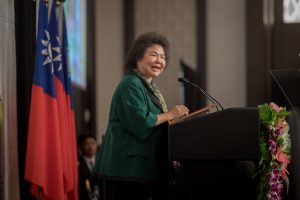Lawmakers in Taiwan’s legislature scuffled Tuesday over the nomination of Chen Chu, a former Kaohsiung mayor and top advisor to President Tsai Ing-wen, to head the Control Yuan, an oversight board that the administration has long wished to eliminate.
Legislators from the opposition Kuomintang (KMT) occupied the Legislative Yuan Tuesday morning while others laid outside on a driveway to block Chen from entering and thus delay the nomination proceedings.
KMT legislators then clashed with lawmakers from the Democratic Progressive Party (DPP) as they tried to enter through a back door while Chen was escorted by police through a side door, only for KMT members to take down the speaker’s podium in the chamber.
Chen left the legislature at around 11:30 a.m. after realizing she would not be able to stand for a review of her nomination as planned, and later posted the report she had planned to deliver on Facebook.
It’s the second time in the past two weeks KMT lawmakers have stormed the legislature and scuffled with DPP members to prevent a confirmation vote of Chen, who is expected to be easily nominated as the DPP holds a legislative majority.
The KMT has alleged Chen will not be impartial as she is a DPP member and a former aide to Tsai. As mayor of Kaohsiung, members of her administration were impeached by the Control Yuan, although Chen herself has never been credibly accused of any wrongdoing.
DPP lawmakers have accused the KMT of subverting the democratic process, especially after the KMT suspended the party membership of former Taitung County magistrate Justin Huang after he was nominated by Tsai as vice president of the Control Yuan.
Chen has long been a prominent figure in Taiwanese politics. In 1979, she was one of the “Kaohsiung Eight” dissidents arrested during pro-democracy demonstrations against martial rule in a crackdown on political opposition.
Should Chen be nominated, Tsai plans to make her the first chief of a newly established human rights commission. Other nominees for the Control Yuan and the new commission have backgrounds in women’s rights, Indigenous advocacy, and transitional justice – a longtime sore spot for the KMT, which has resisted DPP efforts to directly confront Taiwan’s decades-long period of martial law.
Tuesday’s brawl came as a broad political consensus grows to eliminate the Control Yuan and the Examination Yuan, another of Taiwan’s five branches of government, instead folding their powers into those of the legislature, amid longtime accusations that their members are not truly independent from the government officials they seek to watch over.
But the DPP and KMT disagree on how to do it. In the past, parties have appeared less inclined to push for the required constitutional amendment to abolish the two bodies while they are in power.
Members of the KMT and the Taiwan People’s Party (TPP), a new party founded last year by Taipei Mayor Ko Wen-je, chanted “Abolish the Control Yuan!” during Tuesday’s occupation. But the KMT criticism stems from their view of Chen as a patronage appointment, with a possible eye on her future role as chair of Taiwan’s new human rights commission.
The recent scuffles also saw the return of what was once an internationally known tradition in Taiwan: brawls in the legislature over controversial votes on bills or appointments.
In lieu of a filibuster or another legislative mechanism to freeze a vote, opposition parties have in the past used violence to stop votes on laws or confirmations, with the KMT resorting to the tactic several times since the DPP gained a legislative majority in 2016.
Tuesday’s tussle led to several injuries, as Alex Fai, a KMT legislator, cut his wrist on a sheet of glass that had been broken in one of the doors to the chamber.
DPP legislator Wang Ting-yu was tackled by KMT lawmaker Hung Mong-kai and, showing visible bruises and scrapes, later accused two assistants of KMT legislator Lin Wei-chou of attacking him.
Lin later said the situation made physical contact inevitable and urged the public not to scrutinize it.
But the two KMT-instigated confrontations have further sullied the party’s image to rebrand itself and connect with disaffected young voters after its drubbing in January’s presidential and legislative elections.
Johnny Chiang, the new party chairman, had pledged during his candidacy to reach out to young voters and reform the KMT. The brawls over Chen’s nomination, however, have come across to the public as more of the same.

































